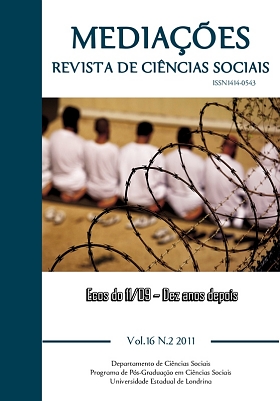Segurança privada e infraestrutura crítica: desafios para a governança da segurança doméstica dos EUA pós 11 de setembro
DOI:
https://doi.org/10.5433/2176-6665.2011v16n2p158Palavras-chave:
Estados Unidos, Segurança privada, Infraestrutura crítica, Segurança domésticaResumo
A governança da segurança dos EUA, após os atentados de 11 de setembro de 2001, tem sido marcada pela participação do setor de segurança privada. Externamente, os EUA têm feito uso de empresas militares privadas para dar apoio ou proteger seus recursos materiais e humanos em zonas de conflito. Internamente, as ameaças de ataques contra a infraestrutura dos EUA alçaram o setor de segurança privada à condição de parceiro chave na promoção da segurança nacional. Uma literatura crescente tem se debruçado sobre o uso de empresas militares privadas em conflitos internacionais, mas o papel da segurança privada na promoção da segurança doméstica dos EUA tem sido largamente negligenciado. O objetivo desse trabalho é discutir alguns dos desafios e implicações que a segurança privada coloca para a governança da segurança nacional dos EUA no período pós-11 de setembro.Downloads
Referências
BAMBERGER, Kenneth. Global terror, private infrastructure, and domestic governance. In: CRAWFORD, Beverly (org.). The impact of globalization on the United States: law and Governance. United States: Praeger Publishers, 2008. v. 2.
BLACK, Julian. Decentring regulation: the role of regulation and self-regulation in a "post-regulatory" world. Current Legal Problems, London, n. 54, p. 103-146, 2001.
BRODEUR, Jean-Paul. High and low policing in post-9/11 times. Policing, United Kingdom, v. 1, n. 1, p. 25-37, 2007.
BURRIS, Scott; KEMPA, Michael; SHEARING, Clifford. Changes in governance: a cross-disciplinary review of current scholarship. Akron Law Review, Akron, v. 41, p. 1-66, 2008.
CEPIK, Marco. Serviços de inteligência: agilidade e transparência como dilemas de institucionalização. 2001. Tese (Doutorado em Ciência Política) - Instituto Universitário de Pesquisas do Rio de Janeiro, Rio de Janeiro, 2001.
CONNORS, Edward; CUNNINGHAM, William; OHLHAUSEN, Peter. Operation cooperation: a literature review of cooperation and partnerships between law enforcement and private security organizations. Washington: Department of Justice, Bureau of Justice Assistance, 1999.
CUNNINGHAM, William; TAYLOR, Todd. The hallcrest report: private security and police in America. Portland: Chancellor, 1985.
DIJK, Jan Van. The world of crime: breaking the silence on problems of security, justice and development across the world UK. London: Sage Publications, 2008.
FLYNN, Stephen. The edge of disaster: rebuilding a resilient nation. New York: Random House, 2007.
FRIEDMAN, Benjamin. Homeland security. Foreign Policy, United States, n. 49, p. 22-29, 2005.
KAKALIK, James; WILDHORN, Sorrel. Private security in the United States. Washington, DC: U.S. Department of Justice, National Institute of Law Enforcement and Criminal Justice, Law Enforcement Assistance Administration, 1972. v. 5.
MANNING, Peter. The United States of America. In: JONES, Trevor; NEWBURN, Tim (org.). Plural policing: a comparative perspective. London: Routledge, 2006.
MORABITO, Andrew; GREENBERG, Sheldon. Engaging the private sector to promote homeland security: law enforcement-private security partnerships. Washington: Department of Justice, Bureau of Justice Assistance, 2005. Disponível em: www.ncjrs.gov/pdffiles1/bja/210678.pdf. Acesso em: 15 maio 2011.
MORAN, Michael. The rise of the regulatory state in Britain. Parliamentary Affairs, London, v. 54, n. 1, p. 19-34, 2001.
PARFOMAK, Paul W. Guarding America: security guards and U.S. critical infrastructure protection. Washington: Congressional Research Service, The Library of Congress, 2004a.
PARFOMAK, Paul W. The U.S. contract security guard industry: an introduction to services and firms. Washington: Congressional Research Service, The Library of Congress, 2004b.
PICCIOTO, Sol. Regulatory networks and global governance. In: W.G. Hart Legal Workshop. The Retreat of the State: Challenges to Law and Lawyers. London: Institute of Advanced Legal Studies, University of London, 2006.
SHEARING, Clifford. A relação entre policiamento público e policiamento privado. In: TONRY, Michael; MORRIS, Norval (org.). Policiamento moderno. São Paulo: Edusp, 2003.
SHEARING, Clifford; STENNING, Philip. Modem private security: its growth and implications. Crime and Justice, San Francisco, v. 3, p. 193-245, 1981.
SINGER, Peter. Corporate warriors: the rise of the privatized military industry and its ramifications for international security. International Security, Cambridge, v. 26, n. 3, p. 186-220, 2001/2002.
STEDEN, Ronald van; SARRE, Rick. The tragic quality of contract guards: a discussion of the reach and theory of private security in the world today. The Journal of Criminal Justice Research, United States, v. 1, n. 1, 2010.
WOOD, Jennifer; DUPONT, Benoît. Democracy, society and the governance of security. Cambridge: Cambridge University Press, 2006.
ZEDNER, Lucia. Liquid security: 'managing the market for crime control'. Criminology e Criminal Justice, United Kingdom, v. 6, n. 3, p. 267-288, 2006.
Downloads
Publicado
Como Citar
Edição
Seção
Licença
Copyright (c) 2011 Cleber da Silva Lopes

Este trabalho está licenciado sob uma licença Creative Commons Attribution 4.0 International License.
Os direitos autorais relativos aos artigos publicados em Mediações são do(a)s autore(a)s; solicita-se aos(às) autore(a)s, em caso de republicação parcial ou total da primeira publicação, a indicação da publicação original no periódico.
Mediações utiliza a licença Creative Commons Attribution 4.0 International, que prevê Acesso Aberto, facultando a qualquer usuário(a) a leitura, o download, a cópia e a disseminação de seu conteúdo, desde que adequadamente referenciado.
As opiniões emitidas pelo(a)s autore(a)s dos artigos são de sua exclusiva responsabilidade.





































